
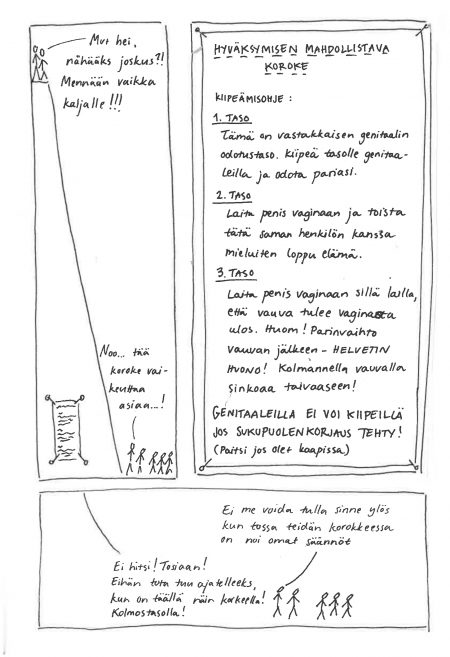
1.But hey, let’s hang out some day! We could go for a beer for examble!!! / Well this high platform effects to things…! 2. The platform where to accept Climbing instructions: Level 1, This level if for waiting the other genital to arrive and making pairs. Level 2, Put penis in to vagaina and repeat if with a same person preferably till the end of your life. Level 3, Put penis in to vagina so that there comes a child from the vagina. Alarm! Changing the pair after a child – bad as hell! On the third child you fly to heaven. YOU CAN’T CLIMP WITH YOUR GENITALS IF GENDER REASSIGNMENT IS DONE! (except if your in closet) 3. We can’t come up there because your platform has those own rules! / A damed! Your right! That did’t come up in my mind, because I’m up here! On the level three!
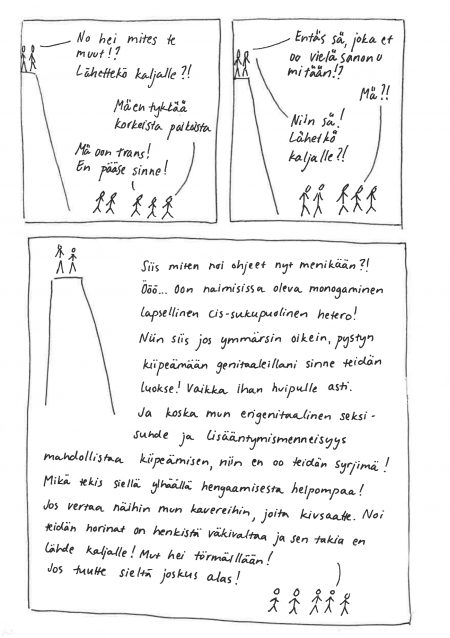
1.Well what about you others? Let’s go for a beer! / I don’t like high places! / I’m trans, I can’t come up there! 2. What about you, who hasn’t said anything yet?! / Me?! / Yes you! Do you want to go for a beer?! 3. Oh, how did these climping directions go?! Ööö… I’m married monogamous cis-gender hetero who has children! So if I understod correctly I can climp with my genitals to level three, where you are! On the top! And because of my parnership with different genitals and reproduction past, you don’t discriminate me! Which would make hanging up there easyer for me! If you compair the situation to my friends who you bully! The thinngs you have said are mental violence and because of that I don’t go to beer with you! But let’s go to beer if you some day decide to come down!
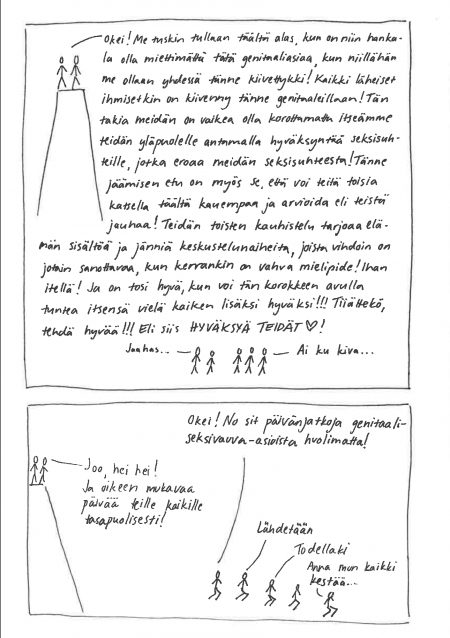
1.Okei! I think we are not coming down from here because it’s hard not to think this genital thing because we have climbed here with genitals in the firtst place! And all our nearest people have also climbed here with their genitals! So because of that it is hard for us not to be above you by speaking of accepting your sex life which is different from our sex life! And we also benefit of being in here, because this way we can see you far away and judge you and gossip! And it is nice to once in a while be horrified because of you, because in those moments we finally have a strong opinion of something! Which is own! And with this platform we can feel ourselfs good and accepted!!! You know, do acceptable things!!! Accept you <3! / Um… / How nice…2. Ok, well then have a good day despite of genital sec baby -things! / Yes, bye bye! And equally nice day for all of you! / Let’s go / Yes, indeed / You really need strenght to bear this all.
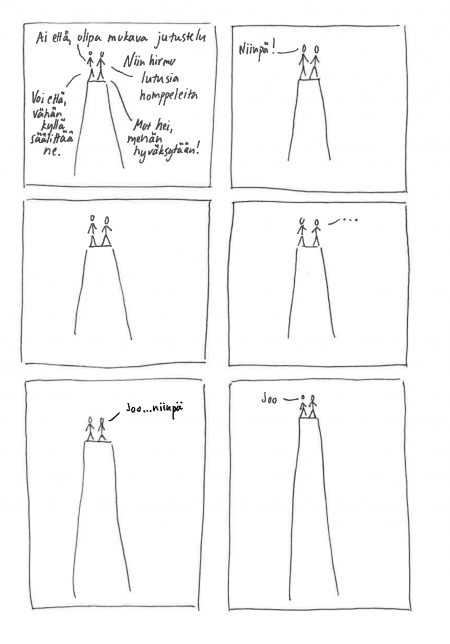
1.Ah, it was so nice to chat / So lovely gay people / But ou, I really pity them a bit / But hey, we accept them! 2. Yeah! 3. … 5. Yes, that’s right 6. Yes.
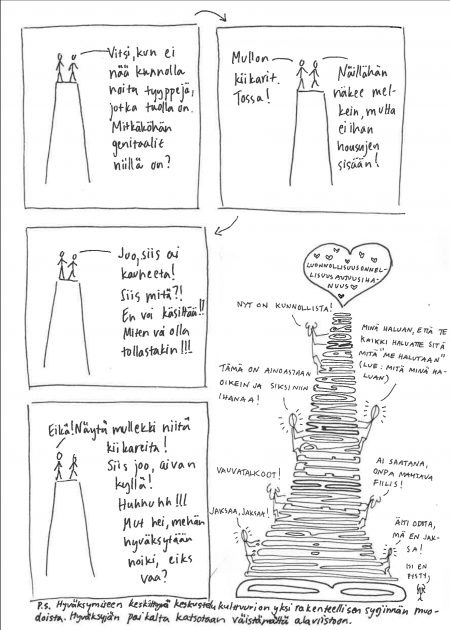
1.It’s a shame that we can’t see probebly those people, who are there. Which genitals they might have? 2. I have binoculars, here you have! / You can see with these almost inside the pants! 3. Ou yes, horrible! What?! I can’t imagine!! How can it be!!! 4. Ou my God, give me those binoculars also! Well yes! Huuhuh! But hey, we accept them, don’t we? 5. Naturalyhappinesblessedlovliness (inside the heart) Binaryheteromonogamy (the thing persons climb on) From up to down: Now this is proper way! / I want, that you want, what ”we want” (read: I want) / This is the only right way and that’s why it’s so wonderful! / Now everybody, make babies! / Oh satan now is good spirit! / Keep on pushing! / Mum wait, I don’t have the energy! / Dad I can’t
*******
Hyväskymistä painottava keskustelukulttuuri on yksi rakenteellisen syrjinnän muodoista. Hyväksyjän paikalta katsotaan väistämättä alaviistoon.
Normatiiviselle valtaväestölle (valkoinen, keskiluokkainen, cis-sukupuolinen, hetero, monogaminen, ei-maahanmuuttajaistettu, ei-rodullistettu) suunnattu suvaitsevaisuus-, hyväksymis-, moninaisuuden kohtaamis- tai kunnioittamisretoriikka on valta-asetelmia rakentava rakenteellisen rasismin ja syrjinnän tuottaja, jota ilmenee laajasti sekä sosiaali-, terveys- että kasvatusalalla.
Hyväntahtoisista pyrkimyksistä huolimatta keskustelukulttuuri on syrjivää ja kehittää keskustelua normatiiviseen, monokultuuriseen ja etnosntriseen suuntaan antaessaan valtaväestölle vastaansanomattoman etulyöntiaseman.
Yhdenvertaisuuden edistäminen ei ole valtaväestön tunteisiin vetoamista, vaan todellisen epäoikeudenmukaisuuden tunnistamista ja sen vähentämistä konkreettisella toiminnalla.
Lisää tietoa aiheesta mm.:
Holm, G. & Londen, M. 2010. The discourse on multicultural education in Finalnd: education from whom?. Intercultural Education, 21, 2, 107-120. Jyväskylän yliopiston kirjasto.
Lappalainen, S. 2006. Kansallisuus, etnisyys ja sukupuoli lasten välisissä suhteissa ja esiopetuksen käytännöissä. Helsinki: Helsingin yliopisto. http://urn.fi/URN:ISBN:952-10-2671-5
*******
A culture of dialogue that emphasizes acceptance is one form of structural discrimination. If your in the position of a person who accepts, you are looking down to ”others”.
The discuss culture of tolerance, acceptance or ”encounter of diversity” is directed to normative population (white, middle-class, cis-sexed, hetero, monogamous, non-immigralized, no-racialized) and this discuss culture is one form of contructional discrimination that keeps normative power contructions up in social-, health and education institutions.
Despite its good intentions this discuss culture discriminating and develops debate in a normative, monocultural, and ethno-ethnic direction, giving the majority population a position where to choose weather to accept or not.
Promoting equality is not about appealing to the feelings of normative people who are in power. It’s about recognizing real injustice and reducing it with concrete action.
Some studies of these theme:
Holm, G. & Londen, M. 2010. The discourse on multicultural education in Finalnd: education from whom?. Intercultural Education, 21, 2, 107-120. Jyväskylän yliopiston kirjasto.
Lappalainen, S. 2006. Kansallisuus, etnisyys ja sukupuoli lasten välisissä suhteissa ja esiopetuksen käytännöissä. Helsinki: Helsingin yliopisto. http://urn.fi/URN:ISBN:952-10-2671-5
**********
